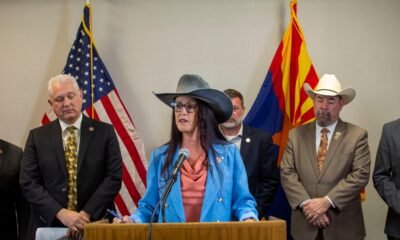Arizona Restaurant Association
Activist Push for Higher Minimum Wage Gains Momentum

Arizonans will not get the opportunity to vote in November on raising the state minimum wage.
One Fair Wage, the group behind Proposition 212, announced on Thursday that it is pulling back the signatures it submitted in July for the ballot measure. The group will now turn its attention to electing candidates who support its cause in the Legislature.
Long-term, the focus will shift from a statewide approach to encouraging individual counties, cities, and towns to set their own minimum wages higher than the state requirement.
However, the decision wasn’t completely voluntary.
Raise the Wage Arizona, a local affiliate of One Fair Wage, submitted 354,278 signatures. The Arizona Restaurant Association, however, filed a lawsuit challenging the validity of some of these signatures in Maricopa County Superior Court.
State law mandates that paid or out-of-state petition circulators register with the Secretary of State’s Office. Attorney Kory Langhofer argued that many did not comply with this rule.
Langhofer also claimed other state law violations governing petition circulators, which could invalidate all signatures collected by those non-compliant circulators. This would bring the total number of valid signatures below the required 255,949 names.
A hearing was scheduled for next week, but the withdrawal of the measure eliminates the need for it.
Saru Jayaraman, president of One Fair Wage, acknowledged that the measure could have potentially survived the legal challenge, but the chances were slim.
“We didn’t want to keep spending money when the odds were increasingly against us,” Jayaraman stated. “That’s why we decided to pivot to legislation and local initiatives.”
Immediately, the group will focus on opposing Proposition 138. This measure, placed on the ballot by the Republican-controlled Legislature, would allow restaurants to pay tipped workers 25% less than the minimum wage, provided their tip earnings are at least $2 an hour above the minimum wage, lowering business costs significantly from the current tip credit of $3 an hour.
Beyond defeating Proposition 138, the goal is to increase the minimum wage on a community level.
The local option is permitted under state law, and Tucson and Flagstaff have already enacted their own minimum wage ordinances. Jayaraman believes other communities will be open to similar initiatives.
Historically, Arizona had no minimum wage until 2006. Voters approved a state minimum wage of $6.75 an hour, with annual adjustments for inflation. This has incrementally increased to the current rate of $14.35 per hour.
Proposition 212 aimed to add a dollar an hour to the minimum wage in January, with another dollar increment by 2026. It also planned to phase out the tip credit, requiring employers to pay at least the minimum wage regardless of tips earned.
With the withdrawal of Prop 212, Steve Chucri, president of the Arizona Restaurant Association, continues to push for Proposition 138.
“This isn’t saving big corporate giants,” Chucri argued. “This is for the mom-and-pop businesses that rely on the tip credit to remain operational.”
Despite previous losses in 2006 and 2016, Chucri is confident voters will support the increased tip credit in Prop 138 this time around.
State Rep. Mariana Sandoval, associated with One Fair Wage, countered that there should be no tip credit at all. “We should not feel pressured to tip because workers aren’t receiving a living wage,” she stated.
Chucri dismissed claims that wage increases and the elimination of the tip credit are driven by outsiders, suggesting employees remain at these restaurants because they are well-compensated.
Even with a $14.35 minimum wage for non-tipped employees, Chucri noted that market demand often requires higher wages to attract and keep staff, especially in fast-food sectors.
Looking ahead, One Fair Wage will utilize the local option as an alternative strategy.
Although gathering enough valid signatures is challenging, concentrating efforts on a few communities at a time might be more practical. Jayaraman mentioned that in some cities, as few as 1,000 signatures might suffice.
Currently, Glendale’s group, Worker Power, has gathered sufficient signatures to propose raising the minimum wage for hotel and event center workers to $20 an hour, along with additional worker protections.
For now, the debate over Prop 138’s future continues, impacting workers and businesses alike.


















